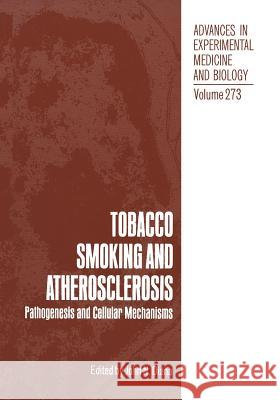Tobacco Smoking and Atherosclerosis: Pathogenesis and Cellular Mechanisms » książka
Tobacco Smoking and Atherosclerosis: Pathogenesis and Cellular Mechanisms
ISBN-13: 9781468458312 / Angielski / Miękka / 2012 / 404 str.
Tobacco Smoking and Atherosclerosis: Pathogenesis and Cellular Mechanisms
ISBN-13: 9781468458312 / Angielski / Miękka / 2012 / 404 str.
(netto: 384,26 VAT: 5%)
Najniższa cena z 30 dni: 385,52
ok. 22 dni roboczych
Bez gwarancji dostawy przed świętami
Darmowa dostawa!
Atherosclerosis is the principal underlying cause of cardiovascular and cerebrovascular disease in people of the Western world. Cigarette smoking has been implicated in both the initiation and exacerbation of the atherosclerotic process. Data to support this implication derives primarily from epidemiologic studies where the relationship between the incidence of atherosclerosis in people who smoke cigarettes has been shown to have a strong correlation. There are few well established explanations for this phenomenon, and basic molecular, biochemical, and cellular mechanisms associated with smoking and the development of atherosclerosis remain both undefined and virtually unexplored. Even the epidemiologic correlation between cigarette smoking and the development of atherosclerosis needs further critical studies. It is known that individuals who do not smoke cigarettes develop athero- sclerosis and it is also known that in people who smoke but have normal or low blood cholesterol/lipoprotein levels, the incidence of development of atherosclerosis is no different from that which is found in a non- smoking population. Answers which explain such observations must address fundamental biological mechanisms. Toward this end, the purpose of this volume is to assemble, in a single publication, information which will address the questions; what basic cellular and/or molecular mechanisms are associated with the development of atherosclerosis and how does cigarette smoking influence such mechanisms to initiate or exacerbate the atherosclerotic process? Clearly, the development of atherosclerosis is a complex, multifactorial biological event.











